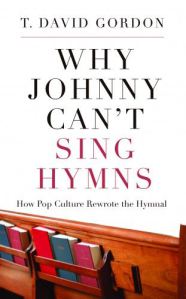Why Johnny Can't Sing Hymns

July 6, 2010

I am currently working on a review of T. David Gordon's excellent new book Why Johnny Can't Sing Hymns. The subtitle of the book is "How Pop Culture Rewrote the Hymnal." Dr. Gordon pulls no punches. He is not rude or abrasive. But he makes his points without apology.
Dr. Gordon seeks to answer the questions, "Why is it that so many people effectively cannot sing traditional hymns? Why, for so many people, do these hymns seem foreign? Why do they seem so strange, unfamiliar, and inaccessible?" (11).
The book aims to be primarily descriptive of the current state of affairs in the musical dimension of corporate worship in the Christian church. Gordon laments the fact that pop music, indeed pop culture in general, has come to define the church's practice of congregational praise. Far from being neutral, Gordon argues, this has been a destructive reality. "We make tools and tools make us."
To treat the house of God or its activities as insignificant, or unworthy of serious Christian reflection, or to treat worship song as though it were nothing more than a matter of amusement or entertainment to be governed by personal preference, is to disregard or disagree with the teachings of the Holy Scriptures regarding both" (35).
I remember as a young youth pastor fully immersed in the church growth/seeker sensitive craze of the late 80's and early 90's hearing (and, sadly repeating) the nonsense that form does not matter; that content can be entirely detached from form. Gordon addresses this idea head-on. Form has a profound impact upon the content. He points out that, usually, wedding ceremonies are formal affairs because the occasion is seen, rightly, as a profound moment. Why, Gordon asks, are our weekly gatherings for praise, prayer, and preaching seen as something so glib that we conclude the form does not matter? "We make tools and tools make us."
The goal of the book "is to explain why we have a preference for music that is often literarily, theologically, or musically inferior" (15). Later Gordon states, "If, as most orthodox thinkers have said, worship is a dialogue between God and his people, and if, as I argue, both his primary means of addressing us (preaching) has declined and our primary means of addressing him (praise) has declined, then worship itself has declined profoundly and almost totally" (17).
For nineteen centuries, all previous generations of the church (Greek Orthodox, Catholic, Protestant, or Revivalist), in every culture, employed prayers and hymns that preceded them, and encouraged their best artists to consider adding to the canon of good liturgical forms. That is, none were traditional, in the sense of discouraging the writing of new forms; and none were contemporary, in the sense of excluding the use of older forms. So why now this insistence that many, most, or all forms of worship be contemporary? My father's generation did not demand that all hymns be written in a big-band idiom, and mine did not demand that they be written to sound like Eric Clapton or The Who...
The question is: Why do so many people appear to find it impossible or unprofitable to use the earlier forms? Why this craving for what sounds contemporary? Why can't Johnny sing hymns? Many people appear hesitant to answer this question, and some even evade it by reasoning that, for whatever reason, people today find contemporary musical forms attractive and noncontemporary musical forms unattractive, and that therefore we must provide such forms to them. But why should the sensibilities of those who many not even know God, or the sensibilities of a commercially driven, banal culture, rule in worship of God? (43).




